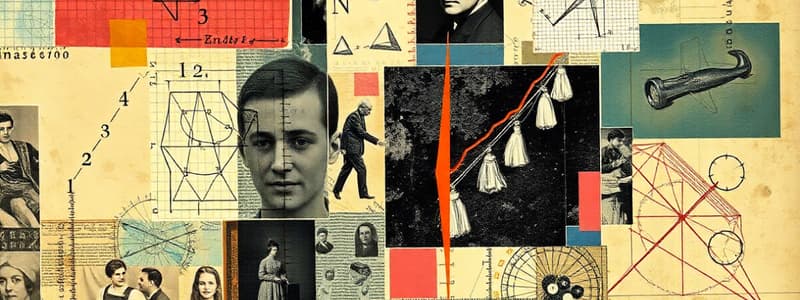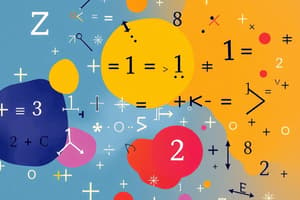Podcast
Questions and Answers
Which branch of mathematics studies the properties of integers and prime numbers?
Which branch of mathematics studies the properties of integers and prime numbers?
What is the primary focus of calculus in mathematics?
What is the primary focus of calculus in mathematics?
In mathematics, what is a function?
In mathematics, what is a function?
What does discrete mathematics primarily focus on?
What does discrete mathematics primarily focus on?
Signup and view all the answers
Which operation is considered the inverse of addition?
Which operation is considered the inverse of addition?
Signup and view all the answers
What is a key characteristic of linear algebra?
What is a key characteristic of linear algebra?
Signup and view all the answers
Arithmetic primarily includes which of the following operations?
Arithmetic primarily includes which of the following operations?
Signup and view all the answers
What is the study of relationships between the sides and angles of triangles called?
What is the study of relationships between the sides and angles of triangles called?
Signup and view all the answers
Study Notes
Fundamental Concepts
- Mathematics is the study of quantities, structures, space, and change.
- It encompasses a wide range of topics including arithmetic, algebra, geometry, calculus, and statistics.
- Basic arithmetic involves operations like addition, subtraction, multiplication, and division.
- Algebra uses symbols to represent unknown quantities and relationships.
- Geometry deals with shapes, sizes, and positions of figures in space.
- Calculus studies change and motion.
- Statistics involves collecting, analyzing, and interpreting data.
Branches of Mathematics
- Arithmetic: Focuses on the basic operations with numbers. Includes addition, subtraction, multiplication, division, and their applications.
- Algebra: Represents unknown quantities with variables and uses equations to solve problems involving these variables.
- Geometry: Analyzes shapes, sizes, and relative positions of figures. Covers plane and solid geometry.
- Calculus: Studies rates of change and motion. Consists of differential and integral calculus.
- Trigonometry: The study of relationships between the sides and angles of triangles. Crucial for navigation and other applications.
- Number Theory: Focuses on the properties of numbers, particularly integers. Covers prime numbers, divisibility, and sequences.
- Discrete Mathematics: Deals with structures that are discrete, not continuous, as opposed to calculus. Includes graph theory, combinatorics, and logic.
- Linear Algebra: Studies vector spaces and linear transformations, important for applications in science and engineering.
Key Math Concepts
- Sets: Collections of objects. Fundamental to many mathematical areas.
- Relations: Connections between sets of objects. Includes functions and mappings.
- Functions: A special type of relation where each input corresponds uniquely to an output.
- Logic: Provides tools for reasoning and deduction, crucial in proofs.
- Proofs: Demonstrations of mathematical statements based on axioms and rules of logic.
- Numbers: Different types like natural numbers, integers, rational numbers, irrational numbers, and complex numbers, each with specific properties.
Mathematical Operations
- Addition: Combining two or more quantities.
- Subtraction: Finding the difference between two quantities.
- Multiplication: Repeated addition of a quantity.
- Division: Repeated subtraction of a quantity.
- Exponentiation: Repeated multiplication.
Problem-Solving Strategies
- Identifying the problem: Understanding the given information and what needs to be found.
- Developing a plan: Choosing a suitable approach, like using formulas, drawing diagrams, or working backwards.
- Carrying out the plan: Implementing the chosen method carefully.
- Checking the answer: Verifying the solution's accuracy.
Practical Applications
- Engineering: Using mathematics to design structures and systems.
- Physics: Modeling natural phenomena with mathematical equations.
- Computer Science: Formulating algorithms and data structures.
- Finance: Analyzing financial markets and making investment decisions.
- Data Analysis: Interpreting data trends and drawing conclusions.
Studying That Suits You
Use AI to generate personalized quizzes and flashcards to suit your learning preferences.
Description
This quiz covers the essential branches of mathematics, including arithmetic, algebra, geometry, calculus, and statistics. Test your understanding of these fundamental concepts and their applications in various scenarios.




